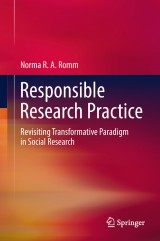Details

Responsible Research Practice
Revisiting Transformative Paradigm in Social Research|
CHF 165.50 |
|
| Verlag: | Springer |
| Format: | |
| Veröffentl.: | 21.04.2018 |
| ISBN/EAN: | 9783319743868 |
| Sprache: | englisch |
Dieses eBook enthält ein Wasserzeichen.
Beschreibungen
This book explores ways in which creative research practice can be explicitly and mindfully geared to make a difference to the quality of social and ecological existence. It offers a range of examples of how different research methods can be employed (and re-tuned) with this intention. The book suggests that what Romm names "active" research involves using the research space responsibly to open up new avenues for thinking and acting on the part of those involved in the inquiry and wider stakeholders. The book includes a discussion of a range of epistemological, ontological, methodological and axiological positions (or paradigms) that can be embraced by inquirers implicitly or explicitly. It details the contours of an epistemology where knowing is recognized to be grounded in social relations, as a matter of ethics. While focusing on discussing the “transformative paradigm” and attendant view of research ethics, it considers to what extent the borders between paradigms can be treated as being permeable in creative and active inquiries. Apart from considering options for enhancing responsible research practice during the process of inquiry (and reconsidering mixed-research designs) the book also considers options for responsible theorizing that is inspirational for pursuing goals of social and ecological justice.
Chapter 1. Introduction: Activating Transformative Intent in Consideration of the Immersion of Research in Social and Ecological Existence.- Chapter 2. Active Focus Group Research with Follow-up Interviews/ Conversations and Actions: Responsibility Re-exploring Race(d) and Classed Relations.- Chapter 3. Active Use of Questionnaires Combined with Focus Group Facilitation: Responsibly Researching Options for Generating Educational Inclusivity .- Chapter 4. Actively Facilitating Individual and Focus Group Narrations: Responsibly Foregrounding Gender Stereotyping While Stimulating (Contextual) Empowerment.- Chapter 5. Active Use of Experiments: Responsibly Inviting Participants and Others to Review Options for Agency.- Chapter 6. Development-oriented Research to Forward Social and Environmental Justice: Responsibly Strengthening Discourses and Actions Toward an Inclusive Wellbeing.- Chapter 7. Responsible Generating Theorizing.- Chapter 8. Practicing Ethical Responsibility: Reconfiguring the Belmont Model.- Chapter 9. Practicing Multiple and Mixed Methods Research Responsibly: Some Paradigmatic Considerations.- Chapter 10. Conclusion to the Book: Storying our Co-responsibilities as Part of Methodological Write-up.
Norma Romm (D Litt et Phil, Sociology) is currently a research professor in the Department of Adult Education and Youth Development at the University of South Africa. She is the author of The Methodologies of Positivism and Marxism (1991), Accountability in Social Research (2001), New Racism (2010), People’s Education in Theoretical Perspective (with V. I. McKay, 1992), Diversity Management (with R. L. Flood, 1996), and Assessment of the Impact of HIV and AIDS in the Informal Economy of Zambia (with V. I. McKay, 2008). She has co-edited three books—Social Theory (with M. Sarakinsky, 1994), Critical Systems Thinking (with R. L. Flood, 1996), and Balancing Individualism and Collectivism (with J. J. McIntyre-Mills and Y. Corcoran-Nantes, 2017). She has published more than 100 research articles on the contribution of research to social development; the way in which research can be practiced accountably; Indigenous ways of knowing and living; transformative-directed research; community-engaged research; and the facilitation of adult learning. She has worked on a range of projects aimed at increasing equity for organizations such as the ILO, ADEA, and IOM.
This book explores ways in which creative research practice can be explicitly and mindfully geared to make a difference to the quality of social and ecological existence. It offers a range of examples of how different research methods can be employed (and re-tuned) with this intention. The book suggests that what Romm names "active" research involves using the research space responsibly to open up new avenues for thinking and acting on the part of those involved in the inquiry and wider stakeholders. The book includes a discussion of a range of epistemological, ontological, methodological and axiological positions (or paradigms) that can be embraced by inquirers implicitly or explicitly. It details the contours of an epistemology where knowing is recognized to be grounded in social relations, as a matter of ethics. While focusing on discussing the “transformative paradigm” and attendant view of research ethics, it considers to what extent the borders between paradigms can be treated as being permeable in creative and active inquiries. Apart from considering options for enhancing responsible research practice during the process of inquiry (and reconsidering mixed-research designs) the book also considers options for responsible theorizing that is inspirational for pursuing goals of social and ecological justice.
Explores how creative research practice can be directed to make a difference to the quality of social and ecological existence Presents a synthesis of different strands and arguments for responsible and accountable social inquiry Revisits transformative paradigm for social research
“Norma Romm provides excellent guidance through theory and practical examples for researchers who accept the challenge of working towards social, economic, and environmental justice for members of marginalized communities. She brings together the work of transformative and indigenous scholars to further understandings of the complex dynamics of contributing to positive social change through the use of innovative research strategies. The examples illustrate an emphasis on addressing social and ecological justice, along with the challenges that researchers encounter in this type of research. This book is an excellent contribution to understanding better how researchers can be responsive to the wicked problems facing the world.” (Donna M. Mertens, Ph.D., Professor Emeritus, Gallaudet University)<p></p>

















